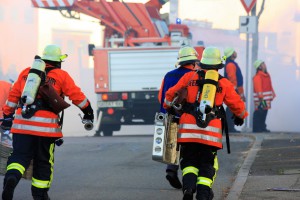 RV fires have been in the news quite a bit lately. They are devastating and dangerous, and it is important to know how to prevent them.
RV fires have been in the news quite a bit lately. They are devastating and dangerous, and it is important to know how to prevent them.
While you are traveling
If a fire were to start while your vehicle is moving, the two most likely culprits include: the engine compartments and/or near the wheels and axles. If you have a diesel engine, you should ensure the engine is cleaned periodically. However, whatever type of engine you have, checking it regularly is important in order to prevent problems. Remember to pay special attention to fuel lines when checking your engine.
It is also important to regularly check to make sure all wheel bearings are well lubricated to prevent friction fires from starting. Consistent and regular tire maintenance is vital, as flat tires can be the cause of fire. Maintain your axles and breaks at the same time, and you will prevent about 20% of RV fires.
While you are parked
Half of RV fires happen when you stop moving. Electrical shorts and faulty wiring is often the largest contributor to these kinds of fires. Therefore, it is important to check your electrical system, or have a qualified electrician do it periodically. Monitor product recalls (fridges have been especially vulnerable in the past) and act quickly when you are impacted.
When you take your RV out of winter storage, it is important to double-check all of the propane fittings. Propane fires are especially dangerous, so you want to make sure that you don’t have any leaks or other potentially harmful issues. You also may want to consider getting a propane leak alarm. If you own a motorhome, check all fuel lines between the living space and the engine.
Ensure all extension cords are in excellent condition, be aware of overloading them and allow your generator to completely cool before refueling.
Fire Safety
Although prevention should be your number one concern, sometimes fires happen. So, make sure you are prepared.
- Keep clutter away from exits. Make sure there is nothing standing between you and a timely exit.
- Stay stocked with fire extinguishers, and be sure to keep one in the kitchen. Know how to use them, and make sure they are fully charged (especially important after they come out of storage).
- Have working smoke and carbon monoxide detectors placed in all sleeping areas. If you don’t, contact us immediately and we will make sure your RV is safely equipped.
- Have a fire escape plan with at least 2 exits. Make sure everyone, including children, knows what to do and where to meet.
Fires are always devastating, but if you are in a dry forested area, or an especially remote area, they can be even worse. Take the precautions now to avoid an RV fire.
